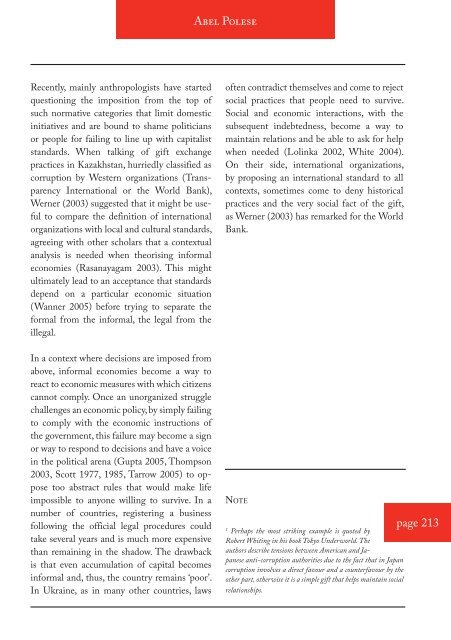Heft36 1 - SFB 580 - Friedrich-Schiller-Universität Jena
Heft36 1 - SFB 580 - Friedrich-Schiller-Universität Jena
Heft36 1 - SFB 580 - Friedrich-Schiller-Universität Jena
Create successful ePaper yourself
Turn your PDF publications into a flip-book with our unique Google optimized e-Paper software.
ABEL POLESE<br />
Recently, mainly anthropologists have started<br />
questioning the imposition from the top of<br />
such normative categories that limit domestic<br />
initiatives and are bound to shame politicians<br />
or people for failing to line up with capitalist<br />
standards. When talking of gift exchange<br />
practices in Kazakhstan, hurriedly classified as<br />
corruption by Western organizations (Transparency<br />
International or the World Bank),<br />
Werner (2003) suggested that it might be useful<br />
to compare the definition of international<br />
organizations with local and cultural standards,<br />
agreeing with other scholars that a contextual<br />
analysis is needed when theorising informal<br />
economies (Rasanayagam 2003). This might<br />
ultimately lead to an acceptance that standards<br />
depend on a particular economic situation<br />
(Wanner 2005) before trying to separate the<br />
formal from the informal, the legal from the<br />
illegal.<br />
In a context where decisions are imposed from<br />
above, informal economies become a way to<br />
react to economic measures with which citizens<br />
cannot comply. Once an unorganized struggle<br />
challenges an economic policy, by simply failing<br />
to comply with the economic instructions of<br />
the government, this failure may become a sign<br />
or way to respond to decisions and have a voice<br />
in the political arena (Gupta 2005, Thompson<br />
2003, Scott 1977, 1985, Tarrow 2005) to oppose<br />
too abstract rules that would make life<br />
impossible to anyone willing to survive. In a<br />
number of countries, registering a business<br />
following the official legal procedures could<br />
take several years and is much more expensive<br />
than remaining in the shadow. The drawback<br />
is that even accumulation of capital becomes<br />
informal and, thus, the country remains ‘poor’.<br />
In Ukraine, as in many other countries, laws<br />
often contradict themselves and come to reject<br />
social practices that people need to survive.<br />
Social and economic interactions, with the<br />
subsequent indebtedness, become a way to<br />
maintain relations and be able to ask for help<br />
when needed (Lolinka 2002, White 2004).<br />
On their side, international organizations,<br />
by proposing an international standard to all<br />
contexts, sometimes come to deny historical<br />
practices and the very social fact of the gift,<br />
as Werner (2003) has remarked for the World<br />
Bank.<br />
NOTE<br />
1<br />
Perhaps the most striking example is quoted by<br />
Robert Whiting in his book Tokyo Underworld. The<br />
authors describe tensions between American and Japanese<br />
anti-corruption authorities due to the fact that in Japan<br />
corruption involves a direct favour and a counterfavour by the<br />
other part, otherwise it is a simple gift that helps maintain social<br />
relationships.<br />
page 213
















